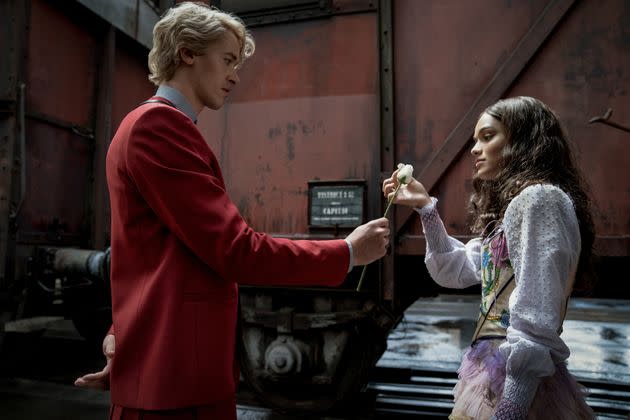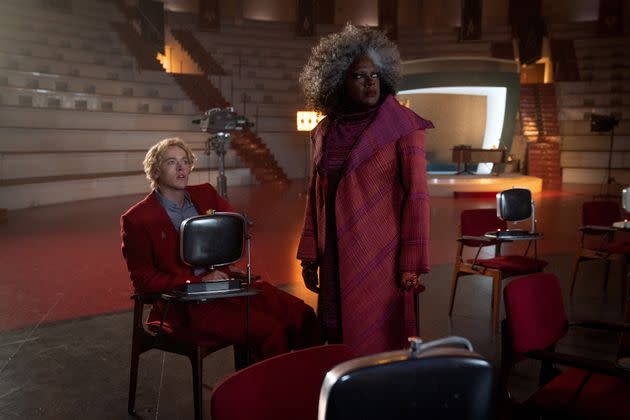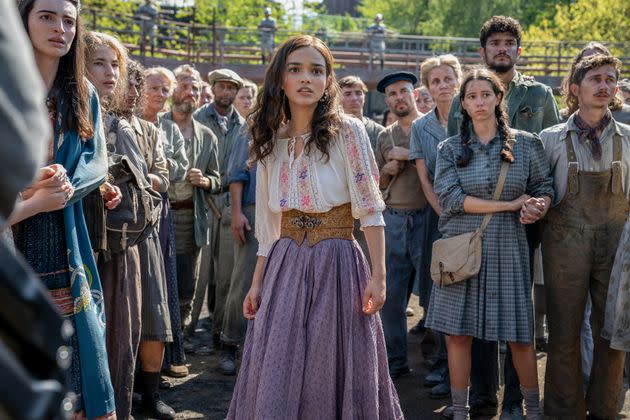We Didn't Need The Evil White Guy Origin Story For 'Hunger Games'

Director Francis Lawrence's latest foray into "The Hunger Games" wasn't worth all the effort.
Eight years after director Francis Lawrence inexplicably gave us not one but two movies adapted from author Suzanne Collins’ concluding novel in the “Hunger Games” series, he finally admitted that splitting the single book into two films actually was not a good idea.
“I totally regret it,” he recently told People magazine. “I totally do. I’m not sure everybody does, but I definitely do.”
Oh, I do, too.
So, imagine returning with yet another installment in the film franchise. This time, an adapted prequel centered on the most evil character in the previous films: Coriolanus Snow, the ruthless ringleader of the Hunger Games and the president of Panem.
Cinematically introduced in 2012’s “The Hunger Games,” the games are the annual ritual of sending “tributes,” ages 12 to 18, to fight to their death inside an arena and for a live audience’s entertainment. It’s punishment for their starved, lower-socioeconomic districts that ever dared to rebel against the oppressive, affluent Capitol. And it went on for 75 years.
The new film, subtitled “Ballad of Songbirds and Snakes,” takes us back to the 10th annual games and a poor young man named Coriolanus (portrayed by Donald Sutherland in the previous films) long before he became president. Now played by a bright-eyed Tom Blyth, we see how he goes from a compassionate mentor to the heartless tyrant we know him to be.
It’s a choice. And not an original one. It’s only the latest in a long trend of origin stories about heinous white guys (thanks, in part, to many entries in the horror and superhero genres). There’s a desire to understand, humanize, discuss and depict how they become vile humans. What or who provoked their metamorphosis?

"Manodrome," starring Jesse Eisenberg, is another recent example of an origin story about a white villain who has been misjudged.
Just this month alone, there’s “Manodrome,” which stars Jesse Eisenberg as Ralphie, a hopeful but underemployed father-to-be who falls in line with a white male supremacist group led by Adrien Brody, whose character (pretty easily, might I add) convinces him to join. Ralphie goes on to murder a Black gay man, terrorize his girlfriend and spectacularly devolve from there.
Because, well, daddy issues or whatever. He wasn’t loved enough as a child and he feels overwhelmed on the cusp of fatherhood. Or so the already flimsy movie’s conclusion suggests.
A far more accomplished film this month is “Napoleon,” director Ridley Scott’s epic starring Joaquin Phoenix that traces the French emperor Napoleon Bonaparte’s rise to infamy. The mere sight of the film’s trailer this summer renewed exasperation from critics and historians alike about the notorious figure getting the cinematic treatment.
There was a similar reaction to the announcement that director Darren Aronofsky is planning a film on Elon Musk, whose long list of offenses have been well-documented.
Many people’s rightful revulsion against the numerous depraved, real-life men in our society today seems to have bled into a distaste for reflections of them, fictionalized or otherwise, on screen. But that can be stifling and frustrating for a storyteller or anyone interested in just good storytelling.

Director Ridley Scott's "Napoleon" is an epic drama about the infamous figure that smartly engages with his legacy.
The Guardian recently challenged director David Fincher on whether his 1999 film “Fight Club” became a catalyst for white incels, as if they didn’t exist before that. In the movie, Edward Norton’s ordinary office worker is activated by Brad Pitt’s anarchical Tyler Durden.
Fincher emphasized what should already be understood: that depiction is not endorsement. But the polarizing conversation around these stories persists, as does the popularity of these characters among many other audiences.
To be fair, they can be really fascinating and provocative, if done well. “Ballad of Songbirds and Snakes,” though, isn’t either of those things.
While the movie feeds off that trending curiosity, it fails to validate its existence beyond the Hollywood routine of squeezing every dollar out of a successful franchise. It doesn’t really add anything to the overall narrative. It’s just… more story. And for no reason at all.
We meet Coriolanus as someone we might have rooted for: a kind, smart and hopeful young man who loves his cousin Tigris (Hunter Schafer) and Grandma’am (Fionnula Flanagan) dearly.
Their relationship is such that Tigris adoringly sews new buttons on Coriolanus’ hand-me-downs and the cousins save any crumbs left in their otherwise hollow refrigerator for Grandma’am. At the start of the “Ballad of Songbirds and Snakes” story, Coriolanus is gracious yet ambitious, with aspirations to simply be able to comfortably provide for his family.

Tom Blyth's Coriolanus and Viola Davis' Dr. Volumnia Gaul are presented as images of good and evil. But the young Coriolanus isn't as complex or interesting as "Ballad of Songbirds and Snakes" would like us to believe.
To do so, though, he must engage with capitalism in the form of the insidious Hunger Games, led by Dr. Volumnia Gaul (a wickedly entertaining Viola Davis), who is rarely seen without cradling a few sizzling snakes to intimidate those around her.
(That image might sound a bit Ursula the Sea Witch-esque. But if you’re familiar with the franchise, you should already know to expect cartoony villains. Dr. Gaul doesn’t disappoint in that regard.)
Coriolanus is initially presented as a bit of a foil to Dr. Gaul. He participates as a mentor in the games, fronting like his many rich, purportedly more nefarious peers that seek pleasure from not only helping to turn children into monsters but also benefiting from whether or not they win the game. It’s more money in his and his family’s pockets.
While Coriolanus is presented here as being conflicted about his role in this, it’s pretty difficult for the audience to be. In fact, it’s hard to feel a whole lot for him at all. He’s pretty much the same person we’ve always known — morally compromised, at best, and selfish and untrustworthy.
So then, why make a new movie about him if the audience is just going to arrive at the same place in terms of his character?
Sure, we learn more about his home life and loved ones, and that he in fact did once have the capacity to love (more on that in a bit). But does that add to the “Hunger Games”? No.

The pulse-pounding scenes of the Hunger Games aren't enough to make up for what the new story lacks.
It’s hard to stay invested in a character whose trajectory you already know. But it is especially hard to remain interested when the trajectory, despite screenwriters Michael Lesslie’s and Michael Arndt’s greatest efforts, isn’t particularly dramatic. There’s not a big evolution here.
So, how does the story attempt to keep viewers interested, beyond the admittedly pulse-pounding scenes of the games? By adding a romance for Corionalus. But this one was always the least remarkable — and outright uncomfortable — aspect going into “Ballad of Songbirds and Snakes.”
Right away, Coriolanus falling in love with his tribute Lucy Gray (spunkily portrayed by Rachel Zegler) is problematic. An oppressed person falling in love with her oppressor is already bad enough. But an oppressed ethnic person (Zegler is half Colombian American) falling for her white oppressor? Double yikes.
Did Hollywood not learn anything from the backlash against “Where Hands Touch,” the 2019 drama that centers on a romance between a Black woman and a Nazi? Never mind that class, not race, is the central source of conflict in all “The Hunger Games” books and films. It still doesn’t look great.
Even more grating is the fact that Lucy Gray isn’t well-written. She swoops into the story as a damsel in distress who sings her way through moments of turmoil (those include when she’s first selected as a tribute and any time she has a brush with death inside the arena). That musical resistance somehow enamors Coriolanus. And it’s meant to charm the audience as well.

The woefully underwritten Lucy Gray is little more than a plot device to advance the character of Coriolanus, her love interest as well as her oppressor. That's problematic.
But that’s hard to do when we don’t quite understand her as a character. She’s not exactly from District 12, though she represents it in the Hunger Games. She has an incomprehensible explanation about that soon after we meet her — something about being from nowhere in particular — with an indiscernible Southern twang and a guitar talent.
Like Katniss’ (Jennifer Lawrence) character in the previous films, Lucy Gray exhibits no real ability to defend herself in the arena, relying almost entirely on Coriolanus’ sly tactics from the inside to save her while she’s in the arena. But unlike Katniss, Lucy Gray’s story is so scantily written inside Coriolanus’ narrative that she is practically reduced to his plot device.
It’s hard to cheer for Lucy Gray when the character isn’t particularly brave or compelling. And really, Zegler seems like she was plucked right off the 2021 “West Side Story” remake set for her musical ability, presence and little else. “Ballad of Songbirds and Snakes” doesn’t cater to her talent beyond singing. There’s nothing distinct about her here.
Coriolanus, however, has lots of story, and yet the movie has very little to say about him other than that he was once a young man. Maybe for some fans, that’s enough to whet appetites. The bizarre world of “The Hunger Games” has always been a fascinating look at a dystopia that feels more and more familiar to our society as the days progress.
But “Ballad of Songbirds and Snakes” isn’t interested in engaging in that discussion or saying anything at all. This movie feels little more than an occasionally thrilling ride back on a familiar roller coaster. It’s gripping while you’re experiencing it, but it doesn’t stick with you afterward.
